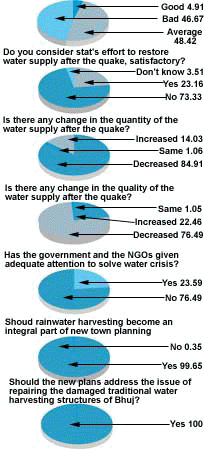| |
A NEW BEGINNING |
|
| Revelling in rain New rain centre in Chennai |
||
CAMPAIGN |
||
| The rights denied Guardians of lakes Rescuing isolated wetlands |
||
IN FOCUS |
||
| Return of the khatris Chandela bunds in bind |
||
INITIATIVE |
||
| Creating
water warriors: CSE trains plumbers and masons Meet us every Friday! Reaping the benefits New dawn Roofwater tappers Every drop counts Harvesting Hope: Sixth Paani Yatra Pride of Doon Tackling water scarcity Turning point |
||
CSE'S LATEST DESIGNS |
||
| Model
projects: Showing the way Eco-conscious business sense |
||
TECHNOLOGY |
||
| Recipe for
greenery Hi-tech filter Better management Can we create rain? |
||
JAL BIRADARI |
||
| Jal
sunwai in Indore |
||
JAL YODHAS |
||
| Shanta
Sheela Nair Vijay Kumar |
||
NEWS FROM CHENNAI |
||
| Temple tank
revived Looking beyond A study planned |
||
NEWS FROM GUJARAT |
||
| Rebuilding
Bhuj |
||
FUNDING AGENCY |
||
| Japan's
loan for rural development |
||
NEWS FROM ABROAD |
||
| Nepal:
Have milk instead.... Bangladesh: Antidote to arsenic |
||

Vol. 4
No.
3
June 2002
![]()
Rebuilding Bhuj
| What people want? How would you rate current water supply in Bhuj?  |
An interesting aspect that marks the rebuilding of Bhuj, the district headquarters of Kutch in Gujarat, ravaged by the 2001 earthquake is that people want rainwater harvesting to be included as an integral part of the new master plan.
About 99.65 per cent of the 285 respondents questioned by the DIsaster Mitigation Institute, an Ahmedabad-based non-governmental organisation (NGO), voted for rainwater harvesting, as a sustainable solution to fight the water crisis. (see pie charts: What people wants?)
Reflecting the mood of the locals, Nipun Buch, an ayurved consultant, said "Rebuilding the entire town is a rare opportunity. If we use this wisely, we can secure ourselves against water scarcity, which is a much bigger problem than the earthquake."
The survey, conducted in May 2002, to know people’s opinion on ways to rebuild Bhuj, covered 136 males and 149 females from 20 different areas of the city. The respondents were selected randomly, cutting across caste, creed, religion, age and income groups.
The survey also revealed that some respondents like, Buch and four of his neighbours, have decided to take matters into their own hands, instead of waiting for help from the government or NGOs. They have adopted roof water harvesting in their new homes. These people were so committed to finding a sustainable solution to their problems that they were not disheartened by hurdles like lack of finances or technical information.
After the earthquake in January 2001, what emerged as the most difficult task was rebuilding the livelihoods of affected people. Most of the water structures such as ponds, wells, check dams etc were completely damaged. The government now plans to spend about 18.6 per cent of the estimated Rs 236 crore on improving the water supply in this region.Unfortunately, the authorities while preparing plans to expand the existng township has selected land with relatively better groundwater reserves.
To make sure water levels do not dip beyond the point of redemption, every such endeavour will have to incorporate methods to ensure recharge, like rainwater harvesting.
Japan's loan for rural development
 "This year, the Japan Bank for
International Cooperation (JBIC), will focus on funding rural development projects,"
according to JBIC’s M C Singh. The bank provides concessionary long-term, low
interest funds as part of Japan’s Official Development Assistance (ODA) loans for
developing socio-economic infrastructure in developing countries.
"This year, the Japan Bank for
International Cooperation (JBIC), will focus on funding rural development projects,"
according to JBIC’s M C Singh. The bank provides concessionary long-term, low
interest funds as part of Japan’s Official Development Assistance (ODA) loans for
developing socio-economic infrastructure in developing countries.
In 1957, India was the first country to receive Yen Credits from Japan. Since then, ODA loans have funded several projects in India. JBIC, which was set up in October 1999, has funded projects in different sectors.
In the water and sanitation sector, JBIC has funded the Bangalore Water Supply and Sewage project, Kerala Water Supply project, Urban Water Supply and Sanitation Improvement program in Maharashtra, and Bhoj Wetlands project among many others.
These funds are given to organisations and not individuals. The Union Ministry of Finance sends notices in July to other union ministries and state departments requesting for proposals. Sanctioning of projects takes about nine months.
Once the project begins, JBIC is involved in multiple responsibilities ranging from the fact-finding to the completion. According to Singh, "Projects with a financial limit less than Rs 50 crore are not directly monitored by JBIC but given on line of credit to other organisations. HUDCO handles 30 such projects."
For further information:JBIC, 3rd Floor
DLF Centre
Sansad Marg,
New Delhi 110001
Tel: 3714362/3
http://www.jbic.go.jp